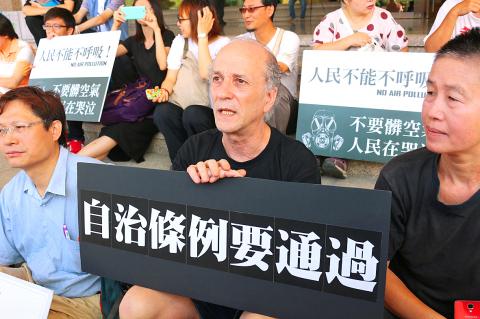The Yunlin County Council yesterday passed local legislation prohibiting the county’s industries from burning soft coal and petroleum coke, but environmental campaigners voiced concern that the central government might reject the regulations, sinking their campaign against air pollution.
Anti-PM2.5 Youth Action Alliance convener Chang Chia-wei (張家偉) said that yesterday marked the first council session to discuss the bylaw, which county councilors put to a vote and passed before noon.
The outcome was “totally unexpected,” Chang said.

Photo: Chan Shih-hung, Taipei Times
He said that the bylaw’s passage could inspire other municipalities in central and southern Taiwan to follow up on banning the fuels, thereby improving air quality.
However, he said that the bylaw, proposed by Yunlin County Commissioner Lee Chin-yung (李進勇) of the Democratic Progressive Party (DPP), was passed without a plenary of the DPP caucus, which he suspected could be due to conflicting stances on the issue among county councilors and the county government.
Citing a statement by the Ministry of Economic Affairs, Chang said that there is a high probability that the bylaw would be rejected by the Executive Yuan, which could reflect badly on the county government, as it would draw on public opinion that Lee was just “putting on a show” about cutting industrial air pollution.
The ministry last month said that if all six central and southern Taiwan municipalities that signed a petition against the use of soft coal and petroleum coke were to ban the fuels from being used at coal-fired power plants, Taiwan would face a nationwide power shortage.
According to Chang, some county councilors who attended the session yesterday said that Lee has the authority to deny power plants permits to burn the fuels and that Lee could be using the county council as a “scapegoat” to circumvent public censure if the bylaw is rejected.
Meanwhile, employees of Mailiao Power Corp, a Formosa Plastics Group (FPG, 台塑集團) subsidiary that manages a naphtha cracker in Yunlin, said the ban would result in many of the workers there losing their jobs.
Corporation union director Wang Chen-wei (王鎮緯) said that the permits for two power plants in the complex to use soft coal and petroleum coke would expire next month and in July respectively, and if Lee does not renew the plants’ permits, they might go bankrupt or close down.
He called on Lee to renew the permits.
Wild at Heart Legal Defense Association founder Robin Winkler called Mailiao Power’s remarks a “classic ploy” of an industry trying to avoid its responsibilities by pitting a labor rights issue against an environmental one.
Winkler questioned the legitimacy of Mailiao Power’s statement, saying that the company is attempting to create a “false issue.”
Meanwhile, the ministry poured cold water on the Yunlin Country Government legislation, saying that it would affect the nation’s power generation and the public’s right to electricity.
Citing Article 6 of the Energy Administration Act (能源管理法) and Article 20 of the Air Pollution Control Act (空氣汙染防制法), the Bureau of Energy said it is the central government that has the authority to ban the burning of petroleum coke and coal for power generation.

The CIA has a message for Chinese government officials worried about their place in Chinese President Xi Jinping’s (習近平) government: Come work with us. The agency released two Mandarin-language videos on social media on Thursday inviting disgruntled officials to contact the CIA. The recruitment videos posted on YouTube and X racked up more than 5 million views combined in their first day. The outreach comes as CIA Director John Ratcliffe has vowed to boost the agency’s use of intelligence from human sources and its focus on China, which has recently targeted US officials with its own espionage operations. The videos are “aimed at

STEADFAST FRIEND: The bills encourage increased Taiwan-US engagement and address China’s distortion of UN Resolution 2758 to isolate Taiwan internationally The Presidential Office yesterday thanked the US House of Representatives for unanimously passing two Taiwan-related bills highlighting its solid support for Taiwan’s democracy and global participation, and for deepening bilateral relations. One of the bills, the Taiwan Assurance Implementation Act, requires the US Department of State to periodically review its guidelines for engagement with Taiwan, and report to the US Congress on the guidelines and plans to lift self-imposed limitations on US-Taiwan engagement. The other bill is the Taiwan International Solidarity Act, which clarifies that UN Resolution 2758 does not address the issue of the representation of Taiwan or its people in

US Indo-Pacific Commander Admiral Samuel Paparo on Friday expressed concern over the rate at which China is diversifying its military exercises, the Financial Times (FT) reported on Saturday. “The rates of change on the depth and breadth of their exercises is the one non-linear effect that I’ve seen in the last year that wakes me up at night or keeps me up at night,” Paparo was quoted by FT as saying while attending the annual Sedona Forum at the McCain Institute in Arizona. Paparo also expressed concern over the speed with which China was expanding its military. While the US

SHIFT: Taiwan’s better-than-expected first-quarter GDP and signs of weakness in the US have driven global capital back to emerging markets, the central bank head said The central bank yesterday blamed market speculation for the steep rise in the local currency, and urged exporters and financial institutions to stay calm and stop panic sell-offs to avoid hurting their own profitability. The nation’s top monetary policymaker said that it would step in, if necessary, to maintain order and stability in the foreign exchange market. The remarks came as the NT dollar yesterday closed up NT$0.919 to NT$30.145 against the US dollar in Taipei trading, after rising as high as NT$29.59 in intraday trading. The local currency has surged 5.85 percent against the greenback over the past two sessions, central